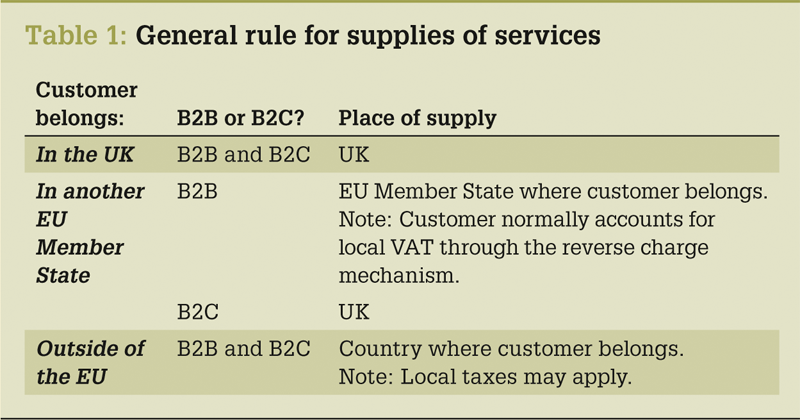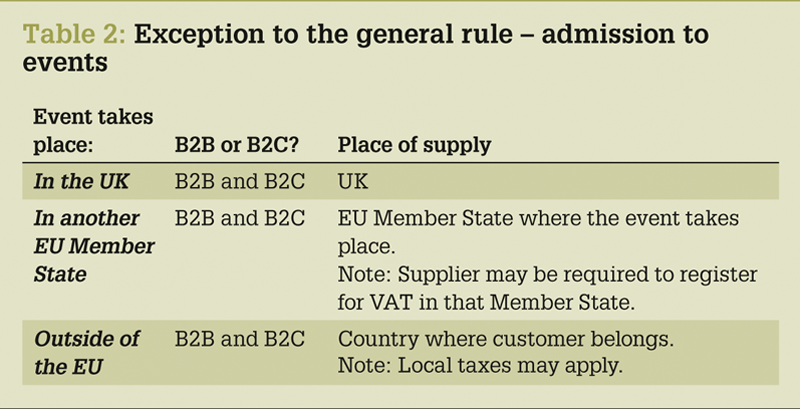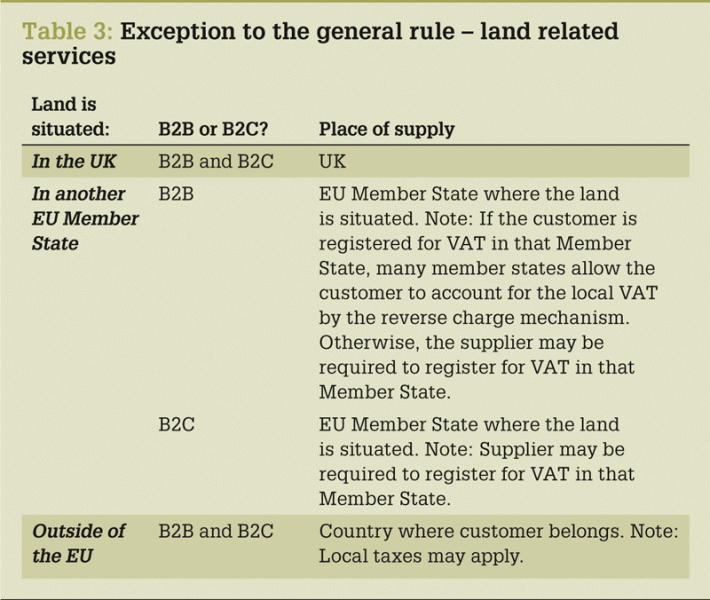1 January 2010 saw the introduction of ‘The VAT Package’ across the EU, which established a new general rule for supplies of services between businesses (set out in VATA 1994 s 7A). The rule depends on where the customer belongs and whether there is a B2B supply (ie, providing services to a relevant business person), or a B2C supply. Exceptions to the PoSS general rule include admission to events, services relating to land, short-term hire of means of transport, and passenger transport. The first two exceptions give rise to the most queries in practice.
After the extensive changes to the place of supply rules in 2010 and 2011, Richard Wild looks at the new VAT landscape for cross-border service providers.
 While VAT rules governing the place of supply of goods have remained fairly static, businesses supplying cross-border services have seen significant changes to their VAT position in the last few years.
While VAT rules governing the place of supply of goods have remained fairly static, businesses supplying cross-border services have seen significant changes to their VAT position in the last few years.
1 January 2010 saw the introduction of ‘The VAT Package’ across the EU, which established a new general rule for supplies of services between businesses and, on 1 January 2011, that rule was broadened to include some performance-based services. In the long run, most commentators may see this as welcome simplification but the European Commission and HMRC seem to have underestimated the teething problems. Space does not permit a comprehensive guide to the place of supply of services (HMRC’s Notice 741A runs to 96 pages), but this article aims to address the key issues and difficulties that are frequently encountered.
In UK law, the place of supply of services (PoSS) is now governed by VATA 1994 s 7A (unless the service is an exception listed in Sch 4A – discussed in more detail below).
Section 7A(2) sets out the general rule, as follows:
‘(2) A supply of services is to be treated as made —
(a) in a case in which the person to whom the services are supplied is a relevant business person, in the country in which the recipient belongs, and
(b) otherwise, in the country in which the supplier belongs.’
In the absence of any exceptions, sub-s (2)(b) would cause supplies of services to individuals resident outside the EU to be subject to UK VAT. So, these supplies are taken outside the scope of UK VAT by Sch 4A para 16, which covers most of the intangible services that were previously set out in Sch 5.
The general rule for supplies of services is summarised in Table 1. All examples in this article assume that the supplier is based in the UK.

It is important to understand whether or not your customer receives your service in a business capacity, particularly if they are located or resident in another EU Member State. This will determine whether you are making a B2B supply (ie, providing services to a relevant business person), or a B2C supply.
Section 7A(4) sets out the definition of a relevant business person, as follows:
‘(4) For the purposes of this Act a person is a relevant business person in relation to a supply of services if the person —
(a) is a taxable person within the meaning of Article 9 of Council Directive 2006/112/EC,
(b) is registered under this Act,
(c) is identified for the purposes of VAT in accordance with the law of a Member State other than the United Kingdom, or
(d) is registered under an Act of Tynwald for the purposes of any tax imposed by or under an Act of Tynwald which corresponds to value added tax,
and the services are received by the person otherwise than wholly for private purposes.’
In practice, this means that a B2B supply also includes supplies to organisations that have a mixture of business and non-business activities, such as charities and government departments, even if the services are being acquired entirely for the purposes of the non-business activities. Conversely, a B2C supply can be made, not just to private individuals, but also to organisations that have entirely non-business activities. In theory, a B2C supply can also be made to a normal business customer if it will be used for private purposes, although such circumstances are rare.
PoSS rules apply to supplies into the UK, as well as supplies made from the UK, so organisations with entirely non-business activities will not have to account for VAT under the reverse charge mechanism. This is of particular benefit if services are being acquired from outside the EU, which may otherwise bear both local taxes and UK VAT.
Of course, suppliers must obtain evidence that the supply is being received for business purposes and is, therefore, not subject to VAT. The customer’s VAT registration number is normally the best evidence and should be shown on the face of your invoice, together with a statement that the supply is subject to the reverse charge. If your customer is not VAT registered, but the supply is still B2B, you can accept alternative evidence such as business letterheads or other commercial documents which illustrate the nature of the customer’s activities.
For a B2C supply, identifying where a private individual is located is usually relatively straightforward; they are treated as belonging in the country where they have their usual place of residence, typically where they have set up home and are in full-time employment. However, the position for B2B supplies can be more complicated, especially where your customer operates in more than one country. In these circumstances, the PoSS is usually determined as follows:
1. Identify the customer’s business establishment, ie, the principal place of business, usually the head office, headquarters or ‘seat’ from which the business is run.
2. Identify whether the customer has a fixed establishment in a different country. A fixed establishment may be a branch or other office or workplace which has sufficient human and technical resources to make it capable of receiving your services.
3. If no fixed establishment exists, then the supply will be treated as being made to the business establishment, and the location of the business establishment will determine the PoSS.
4. If your customer has a business establishment and a fixed establishment(s), determine which is most closely related to the supplies you are making: that establishment is treated as receiving the supply and dictates the PoSS.
For example, assume you provide advertising services to a customer, which has its business establishment in Austria, but also a fixed establishment (a branch) in the UK. Day-to-day contact on routine administrative matters is between you and the UK branch, but the Austrian establishment takes all artistic and other decisions about the advertising. In these circumstances, the supplies are treated as taking place in Austria and would be subject to the reverse charge by your customer.
Multinationals should still be wary of the ‘force of attraction’ concept, which a few Member States used pre-2010 to override the ‘most closely related’ principle. Some remnants of this may still complicate the position for a business holding global contracts or using overseas branches to serve customers in its own Member State, so seek detailed advice if you think it affects your business.
Every good rule has its exceptions. Exceptions to the PoSS general rule include admission to events, services relating to land, short-term hire of means of transport, and passenger transport. In practice, the first two exceptions give rise to the most queries.
Admission to events
Cultural, artistic, sporting, scientific, educational, entertainment and similar services were brought within the general rule with effect from 1 January 2011. It was hoped that this would simplify the treatment of many performance-based services – unfortunately, this has not been the case. In particular, while services relating to such events (eg, behind the scenes organisation) may fall within the general rule, admission to an event does not. This was recently clarified by Article 32 of EC Council Regulation 282/2011 which states that the following should be treated as taking place where the event itself takes place:
So, the VAT treatment of admission to events is as set out in Table 2.

This becomes a real problem area, particularly for organisations that run conferences, ie:
Services relating to land
Services relating to land are treated as taking place where the land is located (see Table 3).

This sounds fairly straightforward but, in practice, two areas can cause difficulty. First, what is land? There is no definition of land for these purposes, but it is taken to include the buildings and anything else permanently affixed to the land. It also covers equipment which is a structure in its own right, for example a fixed oil/gas production platform, but would exclude machinery such as self-propelled jack-up vessels.
Second, are the services ‘land related’? The sale and lease of property falls within this heading, as can the work of professionals such as architects, surveyors and estate agents. However, only services which directly relate to a specific site of land fall into the ‘land-related’ exception. HMRC gives a number of helpful examples in Notice 741A:
‘… the services of an interior designer contracted to redesign the decor of a particular hotel would be land-related. However, if the same supplier was contracted to create a ‘corporate’ colour scheme/style for a hotel chain to use in their own properties, those design services would not be land-related because they do not relate to a specific property.’
Again, tensions can arise when carrying out B2B supplies for overseas customers. For instance, repair works to a UK property would be subject to UK VAT, even if its owner is based in Germany. Only recently, I was asked to advise on the PoSS for legal services (relating to a noise dispute over replacing the carpeting in a flat with wooden floors) supplied to a US landlord. Here, the connection with the land was more tenuous and it was obviously better for the client for the services to fall within the general rule, as no VAT would have been chargeable.
The above issues are just the tip of the PoSS iceberg. As we have discussed, there are already many other practical matters for the cross-border supplier to contend with, including local taxes, invoicing obligations, and EC Sales Lists. And don’t forget that many EU Member States apply a nil VAT registration threshold for overseas businesses (including the UK from 1 December 2012), so it is wrong to assume that you can keep small-scale international activities ‘under the radar’. The risk of penalties if you get it wrong is slowly growing too – even the most recent changes are over a year old, making it more difficult to convince HMRC that reasonable care has been taken in the event of a mistake.
Inconsistencies between the 27 Member States continue to make life difficult and the overall picture is bound to evolve. It seems inevitable that the finer points of the legislation supporting the new PoSS regime will be tested at the CJEU before too long.
Richard Wild, Director, PKF
1 January 2010 saw the introduction of ‘The VAT Package’ across the EU, which established a new general rule for supplies of services between businesses (set out in VATA 1994 s 7A). The rule depends on where the customer belongs and whether there is a B2B supply (ie, providing services to a relevant business person), or a B2C supply. Exceptions to the PoSS general rule include admission to events, services relating to land, short-term hire of means of transport, and passenger transport. The first two exceptions give rise to the most queries in practice.
After the extensive changes to the place of supply rules in 2010 and 2011, Richard Wild looks at the new VAT landscape for cross-border service providers.
 While VAT rules governing the place of supply of goods have remained fairly static, businesses supplying cross-border services have seen significant changes to their VAT position in the last few years.
While VAT rules governing the place of supply of goods have remained fairly static, businesses supplying cross-border services have seen significant changes to their VAT position in the last few years.
1 January 2010 saw the introduction of ‘The VAT Package’ across the EU, which established a new general rule for supplies of services between businesses and, on 1 January 2011, that rule was broadened to include some performance-based services. In the long run, most commentators may see this as welcome simplification but the European Commission and HMRC seem to have underestimated the teething problems. Space does not permit a comprehensive guide to the place of supply of services (HMRC’s Notice 741A runs to 96 pages), but this article aims to address the key issues and difficulties that are frequently encountered.
In UK law, the place of supply of services (PoSS) is now governed by VATA 1994 s 7A (unless the service is an exception listed in Sch 4A – discussed in more detail below).
Section 7A(2) sets out the general rule, as follows:
‘(2) A supply of services is to be treated as made —
(a) in a case in which the person to whom the services are supplied is a relevant business person, in the country in which the recipient belongs, and
(b) otherwise, in the country in which the supplier belongs.’
In the absence of any exceptions, sub-s (2)(b) would cause supplies of services to individuals resident outside the EU to be subject to UK VAT. So, these supplies are taken outside the scope of UK VAT by Sch 4A para 16, which covers most of the intangible services that were previously set out in Sch 5.
The general rule for supplies of services is summarised in Table 1. All examples in this article assume that the supplier is based in the UK.

It is important to understand whether or not your customer receives your service in a business capacity, particularly if they are located or resident in another EU Member State. This will determine whether you are making a B2B supply (ie, providing services to a relevant business person), or a B2C supply.
Section 7A(4) sets out the definition of a relevant business person, as follows:
‘(4) For the purposes of this Act a person is a relevant business person in relation to a supply of services if the person —
(a) is a taxable person within the meaning of Article 9 of Council Directive 2006/112/EC,
(b) is registered under this Act,
(c) is identified for the purposes of VAT in accordance with the law of a Member State other than the United Kingdom, or
(d) is registered under an Act of Tynwald for the purposes of any tax imposed by or under an Act of Tynwald which corresponds to value added tax,
and the services are received by the person otherwise than wholly for private purposes.’
In practice, this means that a B2B supply also includes supplies to organisations that have a mixture of business and non-business activities, such as charities and government departments, even if the services are being acquired entirely for the purposes of the non-business activities. Conversely, a B2C supply can be made, not just to private individuals, but also to organisations that have entirely non-business activities. In theory, a B2C supply can also be made to a normal business customer if it will be used for private purposes, although such circumstances are rare.
PoSS rules apply to supplies into the UK, as well as supplies made from the UK, so organisations with entirely non-business activities will not have to account for VAT under the reverse charge mechanism. This is of particular benefit if services are being acquired from outside the EU, which may otherwise bear both local taxes and UK VAT.
Of course, suppliers must obtain evidence that the supply is being received for business purposes and is, therefore, not subject to VAT. The customer’s VAT registration number is normally the best evidence and should be shown on the face of your invoice, together with a statement that the supply is subject to the reverse charge. If your customer is not VAT registered, but the supply is still B2B, you can accept alternative evidence such as business letterheads or other commercial documents which illustrate the nature of the customer’s activities.
For a B2C supply, identifying where a private individual is located is usually relatively straightforward; they are treated as belonging in the country where they have their usual place of residence, typically where they have set up home and are in full-time employment. However, the position for B2B supplies can be more complicated, especially where your customer operates in more than one country. In these circumstances, the PoSS is usually determined as follows:
1. Identify the customer’s business establishment, ie, the principal place of business, usually the head office, headquarters or ‘seat’ from which the business is run.
2. Identify whether the customer has a fixed establishment in a different country. A fixed establishment may be a branch or other office or workplace which has sufficient human and technical resources to make it capable of receiving your services.
3. If no fixed establishment exists, then the supply will be treated as being made to the business establishment, and the location of the business establishment will determine the PoSS.
4. If your customer has a business establishment and a fixed establishment(s), determine which is most closely related to the supplies you are making: that establishment is treated as receiving the supply and dictates the PoSS.
For example, assume you provide advertising services to a customer, which has its business establishment in Austria, but also a fixed establishment (a branch) in the UK. Day-to-day contact on routine administrative matters is between you and the UK branch, but the Austrian establishment takes all artistic and other decisions about the advertising. In these circumstances, the supplies are treated as taking place in Austria and would be subject to the reverse charge by your customer.
Multinationals should still be wary of the ‘force of attraction’ concept, which a few Member States used pre-2010 to override the ‘most closely related’ principle. Some remnants of this may still complicate the position for a business holding global contracts or using overseas branches to serve customers in its own Member State, so seek detailed advice if you think it affects your business.
Every good rule has its exceptions. Exceptions to the PoSS general rule include admission to events, services relating to land, short-term hire of means of transport, and passenger transport. In practice, the first two exceptions give rise to the most queries.
Admission to events
Cultural, artistic, sporting, scientific, educational, entertainment and similar services were brought within the general rule with effect from 1 January 2011. It was hoped that this would simplify the treatment of many performance-based services – unfortunately, this has not been the case. In particular, while services relating to such events (eg, behind the scenes organisation) may fall within the general rule, admission to an event does not. This was recently clarified by Article 32 of EC Council Regulation 282/2011 which states that the following should be treated as taking place where the event itself takes place:
So, the VAT treatment of admission to events is as set out in Table 2.

This becomes a real problem area, particularly for organisations that run conferences, ie:
Services relating to land
Services relating to land are treated as taking place where the land is located (see Table 3).

This sounds fairly straightforward but, in practice, two areas can cause difficulty. First, what is land? There is no definition of land for these purposes, but it is taken to include the buildings and anything else permanently affixed to the land. It also covers equipment which is a structure in its own right, for example a fixed oil/gas production platform, but would exclude machinery such as self-propelled jack-up vessels.
Second, are the services ‘land related’? The sale and lease of property falls within this heading, as can the work of professionals such as architects, surveyors and estate agents. However, only services which directly relate to a specific site of land fall into the ‘land-related’ exception. HMRC gives a number of helpful examples in Notice 741A:
‘… the services of an interior designer contracted to redesign the decor of a particular hotel would be land-related. However, if the same supplier was contracted to create a ‘corporate’ colour scheme/style for a hotel chain to use in their own properties, those design services would not be land-related because they do not relate to a specific property.’
Again, tensions can arise when carrying out B2B supplies for overseas customers. For instance, repair works to a UK property would be subject to UK VAT, even if its owner is based in Germany. Only recently, I was asked to advise on the PoSS for legal services (relating to a noise dispute over replacing the carpeting in a flat with wooden floors) supplied to a US landlord. Here, the connection with the land was more tenuous and it was obviously better for the client for the services to fall within the general rule, as no VAT would have been chargeable.
The above issues are just the tip of the PoSS iceberg. As we have discussed, there are already many other practical matters for the cross-border supplier to contend with, including local taxes, invoicing obligations, and EC Sales Lists. And don’t forget that many EU Member States apply a nil VAT registration threshold for overseas businesses (including the UK from 1 December 2012), so it is wrong to assume that you can keep small-scale international activities ‘under the radar’. The risk of penalties if you get it wrong is slowly growing too – even the most recent changes are over a year old, making it more difficult to convince HMRC that reasonable care has been taken in the event of a mistake.
Inconsistencies between the 27 Member States continue to make life difficult and the overall picture is bound to evolve. It seems inevitable that the finer points of the legislation supporting the new PoSS regime will be tested at the CJEU before too long.
Richard Wild, Director, PKF







